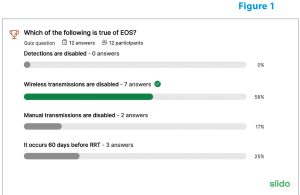
TECHNOLOGY – By Ryan O’Leary
A little competition can help build knowledge
 The medical device sales industry is different from many sales careers in that the technical and clinical competency required can be substantial. That means equipping new sales representatives with robust product knowledge is crucial.
The medical device sales industry is different from many sales careers in that the technical and clinical competency required can be substantial. That means equipping new sales representatives with robust product knowledge is crucial.
But let’s face it, traditional technical training methods can sometimes be booorring. We have all been “slide-whipped” before, and I try my best to minimize this as much as possible.
As a seasoned trainer with both an engineering and a sales background, I’ve found that blending technical learning with a dose of healthy competition accomplishes several goals simultaneously. It not only spices up the training process but also significantly enhances learning outcomes and helps me identify knowledge gaps early.
The Power of Competitive Learning
Competitive learning isn’t just about pitting sales representatives against one another in a battle of memorization. When reps compete on quizzes, they’re not just recalling facts; they’re reinforcing the material and (hopefully) forcing better retention of it.
We all know reps are competitive, so why not lean on that nature during the learning process in addition to the selling process?
Why Short, Online Quizzes Work
Online quizzes are easy to configure, effective as engagement tools and, in short, they work. Here’s why:
- Instant Feedback: Online quizzes provide immediate results, allowing reps to see how they fare against their peers instantly. This instant feedback loop is crucial for adult learners who thrive on understanding their performance in real time.
- Flexibility and Accessibility: In today’s digital age, online platforms offer unparalleled ease and flexibility. Reps just pull out their phone in class, scan the QR code, enter their name and are ready to go.
- Engagement and Motivation: The competitive element of quizzes adds an extra layer of motivation. Sales reps, inherently competitive, are more likely to engage with material when there’s a challenge involved.
- Identifying Knowledge Gaps: Regularly scheduled quizzes help trainers identify areas where reps are struggling, allowing for targeted interventions and additional training resources to be provided.
Case Study: A Typical Class
Let me share an example of how a typical class goes.
The training material is divided up by topics. In a typical two-week class, there might be 10 to 15 topics. Each of these main topics has training materials in the form of PowerPoint presentations, as well as a short quiz, usually three to five questions, that exists on the polling website.
Each rep has a copy of the training material (but not the quizzes) that they can follow along with in class as well as take back to the hotel to study. The morning after a topic is presented in class, I run the quiz associated with it. That way the reps get a chance to digest the information at night and then are quizzed on it the next morning.
The quiz results are recorded, but they are not shared with anyone outside of class. I make sure the reps know this so that they feel more comfortable.
The quiz results measure correct answers as well as time, and the leaderboard is shown at the end of each topic section. Some days there are several quizzes to go through, and some days there is one or even none.
I project “participant” mode on the main screen in class, and I use a separate device like an iPad or another laptop to show “present” mode on my personal screen, which allows me to control the quiz. Tools like Slido show a QR code on the screen that the reps just scan with their phones. All they need to do then is enter their names, and they can take the quiz on their phones.
The trainer can control when the questions are displayed, and the timer starts as soon as each question is shown. You can put a time limit on how long participants have to answer the question, but I typically just wait until everyone has completed their entry.
Displaying the answer takes place in two stages, both controlled by the presenter. The first stage shows everyone the distribution of responses by percentage. This tells me a lot about where the class is in terms of understanding. If there are a few popular answers, I typically ask a representative of each response to “defend their answer.” This is where the great discussions happen and where the learning takes place.
Then I finally move to stage two of the answer reveal that highlights the correct response, as shown in Figure 1. We usually have another brief discussion here to make sure everyone understands why this is the correct answer.
I do not expect perfection on these quizzes, and I always tell reps that this is where you want to get things wrong, as you will not forget the wrong answers that we discuss afterward in class.
Best Practices for Implementing Online Quizzes
If it’s worth doing, it’s worth doing right. These tips help you maximize your use of quizzes:
- Brevity Is the Soul of Wit: The quizzes should be concise yet challenging. Aim for three to five questions that cover the essential points of your training material.
- Foster a Positive Competitive Environment: The goal is to encourage learning, not to create undue stress. Celebrate top performers, but also recognize significant improvements. Always keep the atmosphere more “Saturday Night Live” than “Hunger Games.”
- Incorporate a Variety of Question Types: Use multiple-choice, true or false and scenario-based questions to keep the quizzes dynamic and engaging.
- Regular Scheduling: Consistency is key. Schedule quizzes at regular intervals to maintain engagement and reinforce learning. I prefer the day after learning the material, right away in the morning.
- Use the Data: Analyze quiz results to identify common misconceptions or knowledge gaps. This data is invaluable for tailoring future training sessions.
Conclusion
Incorporating short online quizzes in life sciences sales training is more than just a novel technique; it’s a powerful approach that engages reps in a meaningful and fun way. It reinforces learning, identifies knowledge gaps and fosters a team spirit that is essential in the competitive world of medical device sales.
So, why not inject a little friendly competition into your training regime? Make training an engaging, memorable and effective journey for these new reps who are the face of your business.
 Ryan O’Leary is senior field training program manager for Medtronic Cardiovascular Diagnostics and Services. Email him at ryan.t.oleary@medtronic.com or connect through www.linkedin.com/in/ryan-o-leary-09a8814.
Ryan O’Leary is senior field training program manager for Medtronic Cardiovascular Diagnostics and Services. Email him at ryan.t.oleary@medtronic.com or connect through www.linkedin.com/in/ryan-o-leary-09a8814.









